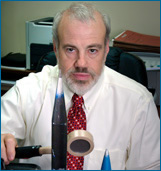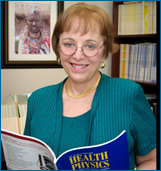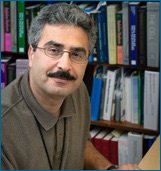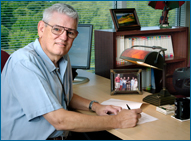Careers at CDC
Health Physicists: Applying Science
A call comes down the line. There has been a possible release of radiation and radioactive material with the potential for human exposure. Who do we call? CDC′s Health Physicists, of course! These men and women are trained to detect, analyze, and evaluate radiological agents in food, human tissue, and the environment.

Speak with a few of CDC′s health physicists and it doesn′t take long to realize that even the above example does little to capture what they actually do. "In many respects," says Paul Charp, PhD, a senior health physicist who works in CCEHIP/ATSDR′s Site and Radiological Assessment Branch, Division of Health Assessment and Consultation, "the field is unlimited and career possibilities are many—homeland security, radioactive waste storage and disposal issues, spent nuclear fuel, and medical use of radioactive materials are important now and will continue to be for the foreseeable future."
What began as a field concerned with the potential adverse health effects that might result from the development of atomic energy has become so much more. While each health physicist might have their own way of describing this intriguing field, there are a few things they all agree on—it′s broad, varied and constantly evolving.
"The field of health physics has evolved greatly since its founding about 60 years ago during the Manhattan Project," says Charp. Much of the earlier research, he says, was basic, today, much of it is applied, yet continues to build on the basic studies as more powerful biological tools are developed.
As a graduate student, Charp′s interest in biological interactions with radiation led him to pursue a MS in radiation biology. He went on to attain a PhD in biology, only to return to his major interest of health physics, for which he received a MS in 1988. That same year, Charp became the first health physicist hired by ATSDR.
One of his more memorable moments in the field involves public health issues related to radium contamination in a community outside Philadelphia, Pa., where he made a recommendation to the EPA that they relocate several families because their homes were contaminated by radium wastes produced in the course of radium needle manufacturing. "Although our initial work began in 1990," Charp says, "I continue to receive inquiries to this date."

Carol Connell′s path to becoming a health physicist with CCEHIP/ATSDR′s Site and Radiological Assessment Branch was paved by lots of stops along the way—gathering experiences that would build on her strengths in the field.
With a certification in nuclear medicine and two years of work experience in-hand, she was offered a job with the state of Georgia in their radiological health program, where she stayed 12 years. And Connell didn′t stop there, going on to work for the US Nuclear Regulatory Commission as an inspector and license reviewer and, finally, arriving at ATSDR in 1992.
Connell has a bit of advice for anyone interested in health physics. "Get a good basic scientific or engineering undergraduate degree first. Since the field is so diverse, it doesn′t matter if the degree is in physics, chemistry, biology, mathematics—in health physics you′ll use it all." She also recommends obtaining practical experience by working in a hospital′s radiology department, collecting environmental samples on a remediation project, or working as a research assistant.

Prior to coming to CDC, Armin Ansari, PhD, had spent eight years working as a senior scientist for a radiological consulting company. While he enjoyed the company and his colleagues, he wanted to do something different. "The opportunity at CDC came along, and I feel very fortunate I was able to come here."
Ansari′s time as a health physicist has not been without its humorous moments. "While still an undergraduate, I was working on a research project late one Friday and was the only one left in the building. I was using the cesium irradiator to irradiate some tissue culture cells and because of a malfunctioning warning light, I mistakenly thought I had irradiated my gonads while kneeling to position the Petri dishes. That made for a memorable weekend!"
In terms of growth in the field of health physics, Ansari is optimistic. For those interested in the field, he recommends talking to as many practicing health and medical physicists as possible, and then being true to oneself as to what exactly matters most. He points out that there are many subspecialties and possible career paths.

CDC′s Radiation Studies Branch was beginning its program in investigating the health impact of historic releases of radioactive materials from the Department of Energy′s former nuclear weapons production and testing sites, when Charles W. Miller, PhD, joined CDC in 1992. Today, Miller heads the NCEH′s Radiation Studies Branch.
"One of our main activities today is helping prepare the public health community to respond effectively in the event of a terrorist attack involving nuclear or radioactive materials. As such, I give numerous presentations to a variety of audiences, participate in committee meetings and emergency preparedness exercises, and help my staff think ‘out of the box′ as we try to determine the needs of the public health community in this area."
Miller′s bustling schedule leaves no doubt the many roles someone in his field can play. He notes that health physics is more an applied rather than a theoretical scientific field. "If you enjoy using sound scientific principles to solve real problems and to help people, then you should consider health physics."
Get email updates
To receive email updates about this page, enter your email address:
Contact Us:
- Centers for Disease Control and Prevention
1600 Clifton Rd
Atlanta, GA 30333 - 800-CDC-INFO
(800-232-4636)
TTY: (888) 232-6348
24 Hours/Every Day - cdcinfo@cdc.gov

